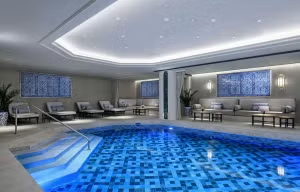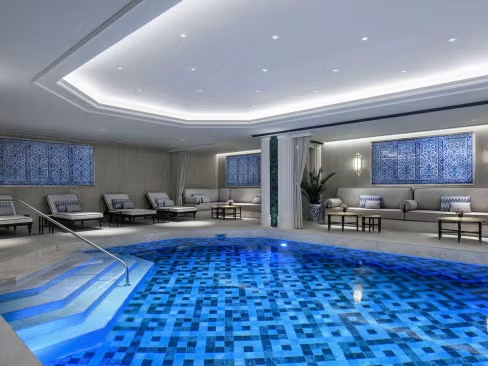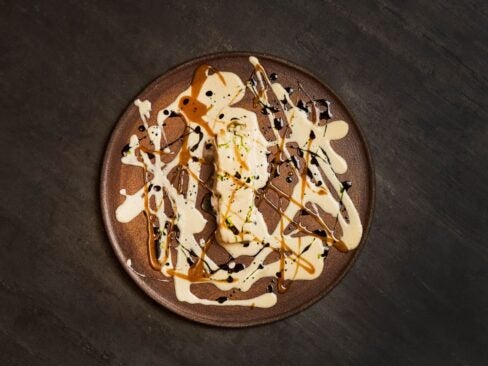 At a time when new hotels and in-depth renovations have slowed, new developments are going strong in Turkey, which is quickly becoming one of the world’s most up-and-coming tourism destinations. Despite the slow worldwide economy, Turkey welcomed 12.8 percent more international visitors in 2008 than 2007, and five percent more American visitors.
At a time when new hotels and in-depth renovations have slowed, new developments are going strong in Turkey, which is quickly becoming one of the world’s most up-and-coming tourism destinations. Despite the slow worldwide economy, Turkey welcomed 12.8 percent more international visitors in 2008 than 2007, and five percent more American visitors.
The popularity has led to aggressive new developments to the nation’s tourism infrastructure. Following is a sampling.
Coming in June: The Most Expensive Hotel in Europe
June will see the unveiling of the Mardan Palace in the Mediterranean resort city of Antalya. At $1.4 billion, the extravagant palace will be the most expensive hotel in Europe and arguably the most luxurious hotel in all of Turkey.
More than 100,000 square feet of gold trimming give the Mardan Palace’s exterior the true Midas touch and combining with almost 250,000 square feet of Italian marble to give the appearance of a gilded wedding cake.
Other ultra-luxurious amenities in the 560-room masterpiece – two of which are royal suites that average $18,000 a night – include a five-acre swimming pool – one of the largest in the Mediterranean; live musicians to serenade spa-goers into the traditional Turkish Hammam; gondoliers along the resort’s on-site river; and a golf course designed by the legendary Jack Nicklaus. For more information visit www.mardanpalace.com
A Landmark Hotel Returns to Its Roots
Divan Istanbul, a landmark hotel in Istanbul for 53 years, is receiving a $50 million redesign – which amounts to a complete rebuild of the property – by renowned architect Thierry W. Despont. Located in the bustling Taksim district, the hotel is Despont’s first and only project in Turkey and is designed to be a unique interpretation of Istanbul’s architectural and cultural heritage. The hotel will house 228 rooms, two feature restaurants, the hotel’s famous Divan Patisserie, fitness center, spa, swimming pool and spacious meeting and conference facilities. The hotel will reopen its doors in 2010.
The overarching theme of the redesign is to “go retro”: the hotel will be rebuilt to its original dimensions and feature old Istanbul’s archictecture, and classical characteristics reinterpreted in a contemporary manner. The façade is made of terracotta panels laid out in a horizontal banding pattern, recalling Istanbul’s old masonry buildings. The grand entry hall is articulated in three large bays covered with translucent domes that allow natural light to pour in to the elegantly appointed interiors of wood, louvered paneling and comfortable furniture. Behind the reception desk the ceramic art piece that was one of the treasured artworks of the old Divan has been reinstalled.
Each bedroom will be contemporary, comfortable and extremely well appointed. The luxurious bathrooms have walls and floors of marble and glass. Each bedroom has a wood paneled seating area reminiscent of a Turkish divan – a long seat formed of a mattress laid against the side of the room.
The Point Hotel Barbaros: “Arch-Tech” at Its Finest
Featuring an “Arch-Tech” concept that combines contemporary art and interior architecture with state-of-the-art technology. Ozbek Turizm has opened the new Point Hotel Barbaros in Istanbul’s centrally located Esentepe district. Opened this spring, the brand new 210-room hotel includes 52 executive suites and will target both business and leisure travelers. Amenities will include international restaurants, a 5,900-square-foot fitness center, a spa, a semi-Olympic indoor swimming pool and a helicopter landing pad. The hotel will have 14 meeting and conference rooms including a ballroom capable of hosting events for up to 800 attendees.
New Archaeological Museum Showcases Turkey’s Breadth and Depth of Ancient Ruins
In addition to hotels, Turkey is celebrating the opening of other “new digs.” No country in the world is more engaged in active archaeology than Turkey, a country possessing more Roman ruins than Italy, more Greek ruins than Greece and remnants of several other fascinating ancient cultures. It’s no surprise why Turkey is often referred to as an outside museum.
This summer will see the opening of a museum dedicated to this vast array of archaeological activity. The new Archaeology Museum will be located at Kaman-Kalehoyuk, an excavation site dating to the Bronze Age in central Turkey about 60 miles southeast of the national capital of Ankara. The site dates back several millennia; recently, examples of what may be the oldest steel fragments in the world – dating to 1800 B.C. – were found at the site.
The museum, an interesting grass-covered, tumulus shaped structure, is an undertaking of the Japanese Institute of Anatolian Archaeology, which has been excavating the site since 1986. The museum is an investment of approximately $4.5 million U.S. Dollars.
www.goturkey.com







